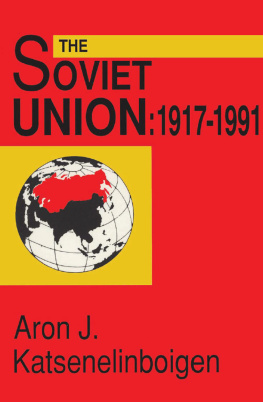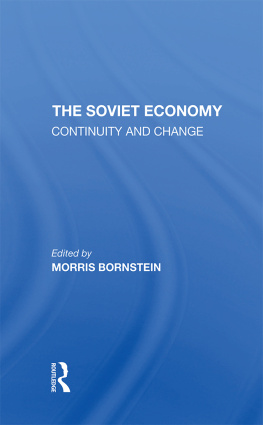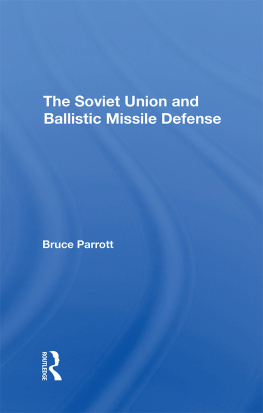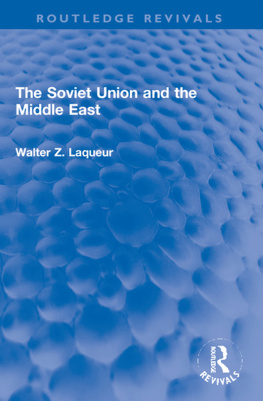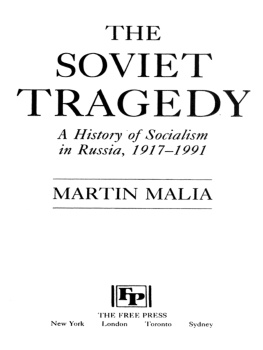THE Soviet Union: 1917-1991
THE Soviet Union: 1917-1991
Aron J.
Katsenelinboigen
First published 1991 by Transaction Publishers
Published 2017 by Routledge
2 Park Square, Milton Park, Abingdon, Oxon OX14 4RN
711 Third Avenue, New York, NY 10017, USA
Routledge is an imprint of the Taylor & Francis Group, an informa business
Copyright 1991 by Taylor & Francis.
All rights reserved. No part of this book may be reprinted or reproduced or utilised in any form or by any electronic, mechanical, or other means, now known or hereafter invented, including photocopying and recording, or in any information storage or retrieval system, without permission in writing from the publishers.
Notice:
Product or corporate names may be trademarks or registered trademarks, and are used only for identification and explanation without intent to infringe.
Library of Congress Catalog Number: 2008027788
The Library of Congress catalogued the original edition of this book as follows:
Katsenelinboigen, Aron.
The Soviet Union : 1917-1991 / Aron J. Katsenelinboigen.
p. cm.
Includes bibliographical references and index.
Originally published under the title: The Soviet Union : empire, nation, and system in 1990
ISBN 978-1-4128-0870-5 (alk. paper)
1. Soviet Union--Politics and government. 2. Soviet Union--Economic conditions. I. Title.
DK266.K354 2009
947.084--dc22
2008027788
ISBN 13: 978-1-4128-0870-5 (pbk)
To my dearest friends Helene and Herbert Levine with love
Contents
First, I would like to express my gratitude to my sons, Grisha and Sasha, for translating a large part of this book into English. In truth, they were not mere translators, but detectives looking for meaning often obscured by my Russian writing style. Parts of the book were translated by Ann Kissin, William Scundrich, and Sharon Stefanowicz.
Special thanks go to Valery Chalidze, Boris Moisheson, Vladimir Shlapentokh, and Alexander Yanov for many discussions concerning the problems dealt with in the book. Vladimir Shlapentokh deserves an additional thank you for regularly supplying me with articles from Soviet periodicals. All these gentlemen have had a big influence on my thinking, and I have internalized their insights to such an extent that by now it is virtually impossible to draw a sharp line between some of their thoughts and mine.
I am grateful to Gregory Grossman, Vladimir Kontorovich, Vladimir Lefebvre, Herbert Levine, Pavel Litvinov, Dmitry Mikheev, Alexander Radin, Alexander Riasanovsky, Vladimir Treml, Valentin Turchin, and Leo Zak, for their comments on some specific issues I touch upon in the following pages.
For help in the long task of bringing my materials into book form, I wish to thank Marvin Wachman, whose intervention got the process of publication started, Katherine Steinberger, who went over the manuscript and offered helpful suggestions, Frances Frei, Mary Kane, Vita Kozlov and my wife Gena, whose technical assistance was invaluable.
I emigrated to the United States from the Soviet Union sixteen years ago. Since then I have been, and still am, mostly interested in the theory of indeterministic systems and its applications to diverse areas of human endeavor. But all along I have also kept a watchful eye on the events in the U.S.S.R., which, incidentally, have provided me with a lot of raw data for my theoretical ruminations.
Yet, time being a limited resource, I somehow had to justify to myself my preoccupation with the Soviet Union. Of course, there were millions of people there, including my friends, suffering from the lack of democratic freedoms and a falling standard of living. But the situation in China and in many African countries was even worse, and better familiarity with the U.S.S.R. was not enough to warrant a heightened interest in it.
Of course, the Soviet Union is a military superpower, and its military preparations and actions cannot leave any one, especially someone who knows the country well, indifferent to what goes on there. But the current strategic situation is such that the Soviet Union stands alone against the entire democratic worldnot to mention the nondemocratic Chineseand it may seem that the West can safely ignore whatever the Soviet Union does, provided it is well-equipped with both conventional and unconventional arms.
The decisive consideration that helped sustain my attention to events in the U.S.S.R. had to do with the fact that the Soviet Union is technologically one of the most advanced countries and with the fact that it employs new technologies not only for military, but also for peaceful purposes. It is in this regard that the Soviet system seems most threatening to its own people and the outside world alike. New technologies, be they in atomic energy, genetic engineering, or chemical manufacturing, are not an unmixed blessing for consumersthey pack a punishing punch if used carelessly, and can end up hurting people who live far away from the user country. In this sense they are global technologies, and for their proper utilization they require not only an investment in environmental protection, but also a sophisticated political and economic system. The Soviet system, however, is such that it cannot, even with the most peaceful and consumer-oriented policies on the part of the leadership, reliably avoid the evils inherent in new technologies. The Chernobyl disaster brought all this out with particular force.
The evolution of Soviet society is thus not only an internal problem for Soviet citizens debating the trade-offs between guns, on the one hand, and butter and freedom, on the other; it concerns not only those who are troubled by the unlimited power and ambitions of Soviet leadership in a period marked by the rapid development of super-lethal weaponry, whose mere accumulation might bring the world to the brink of catastrophe; it is, due to nonmilitary but dangerous new technologies, also becoming a vital problem for people all over the earth.
I have not only thought about these problems, but have tried to make my thoughts public in my writings: two full-length books and a host of articles. The two books Studies in Soviet Economic Planning and Soviet Economic Thought and Political Power in the U.S.S.R. were brought out, respectively by M. E. Sharp in 1978 and Pergamon Press in 1980. Most of my subsequent articles on Soviet society came out in different English-language publications in Great Britain, Japan, and, of course, the United States. Still, a good part of what I have written on the subject has either not been published at all, or has appeared only in Russian-language periodicals, primarily in the magazines Vnutrennie Protivore-chia and Vremia i My. As far as I know, none of these pieces has been published in the Soviet Union, and only one of them, on Soviet multicolored markets, was circulated in the U.S.S.R. through samizdat channels, in reverse translation from the English.
In 1988 these articles were brought together and issued in one book, in Russian, by Chalidze Publications. The books readership in the West, however, has perforce been quite limited. Because of my belief that it would be of interest to broad segments of the English-speaking public, I decided to have it published in that language, after appropriate updating and a drastic reworking of the content to turn a loose collection of articles into a unified structure. Undoubtedly, I have not been entirely successful in covering up the evidence of my crime, with the result that the kaleidoscopic nature of the original material will inevitably reveal itself in one place or another.

